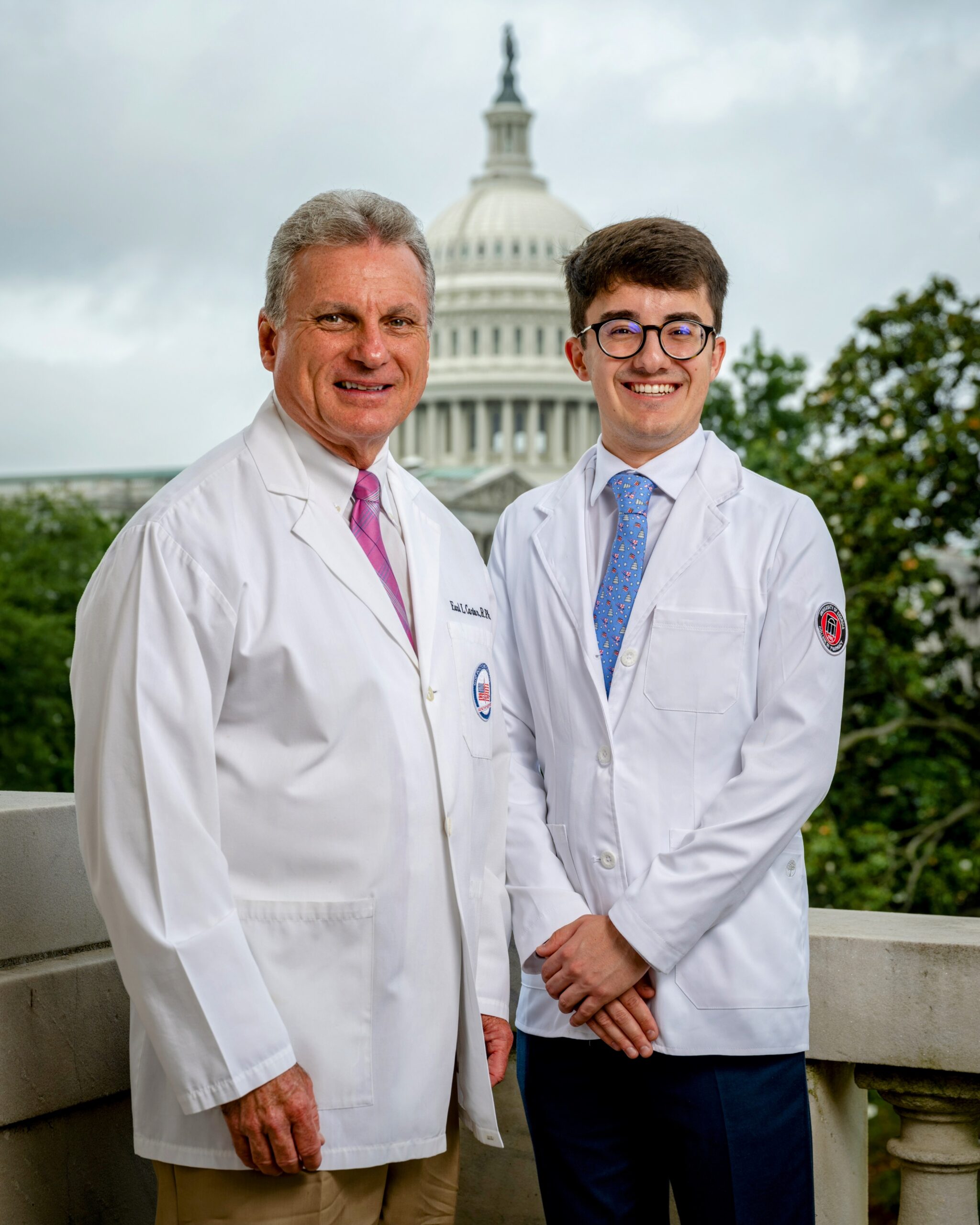By Bryan Gomez
Just three blocks away from the U.S. Capitol, Library of Congress, and the Supreme Court, a humble two-story building sits at the end of a long row of Victorian townhomes, quietly keeping the nation’s heart beating and healthy. Situated behind a quaint garden and fountain, Grubb’s Pharmacy is the sort of ordinary building most people visiting D.C. might walk past and not think twice about. That is, unless you’re Dr. Sarah Adam Bignault —recent graduate, Class of 2023 President, and one of a handful of PharmDawgs who called Washington, D.C. home this summer. Sarah quickly learned to appreciate that Grubb’s is anything but ordinary as she began a year-long joint fellowship between the pharmacy and the National Community Pharmacists Association (NCPA).
Founded in 1867, Grubb’s Pharmacy is the oldest apothecary in the nation’s capital. Often filling hundreds of prescriptions daily, the pharmacy has dispensed millions of tablets and capsules to some of the country’s most important political figures and their staffs during its 150+ year history. It’s an exciting and fast-paced environment that Sarah, who currently works at Grubb’s full-time but will soon shift to part-time to allow for her responsibilities with NCPA, now gets to be a part of through her fellowship. “It’s an amazing chance to learn more about pharmacy management, leadership, and service integration and implementation. Grubb’s is constantly looking at how they can grow the services they offer while brainstorming new ways to do things —and I think that dynamic atmosphere is one of the most rewarding aspects of the fellowship,” said Sarah, reflecting on her first few weeks at Grubb’s.
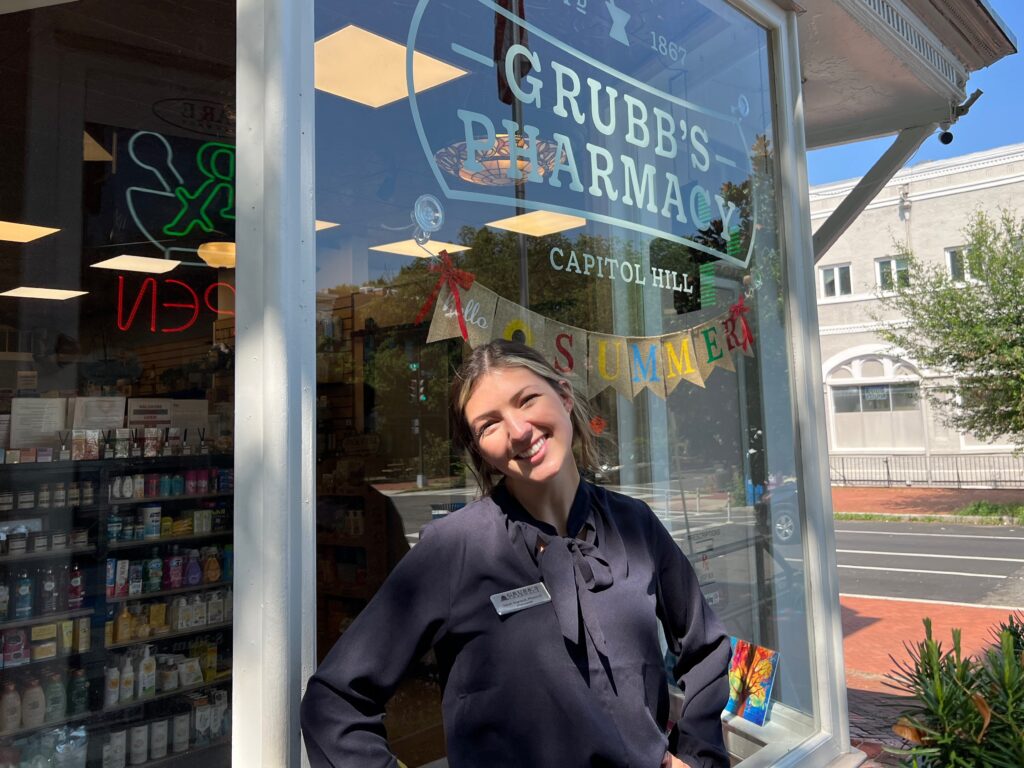
“I’ve witnessed the ingenuity and forward-thinking care that independent pharmacies embody all around here. You see it in the non-sterile compounding lab upstairs; you see it in the sterile compounding room we’re developing to help patients better access the hormone treatments they need; you see it in the wooden shack outside our pharmacy’s back door,” Sarah said with a laugh, referring to the structure Grubb’s erected during the height of the pandemic to safely perform COVID-19 tests and other respiratory-illness-related services. In addition to vaccinating patients and delivering medications directly to patients’ front doors, the pharmacy also offers pre- and post-natal, travel medicine, and nutrition counseling services as part of their ever-growing portfolio. “The nutrition counseling that we’re making more robust here has been especially valuable to me and our patients. Nutrition was an intentional part of UGA’s curriculum, but I didn’t always get to practice what I learned in other pharmacy settings. It’s great that, in an independent pharmacy, we have the flexibility to be able to bring that value-added part of our education directly to our patients,” notes Sarah, adding, “It’s another opportunity to demonstrate just how valuable pharmacists really are to their communities.”
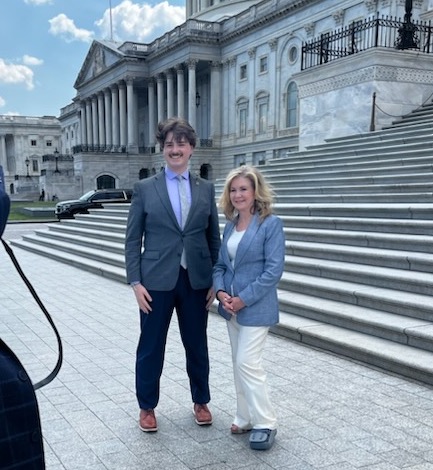 That value is precisely what students such as Roswell Cole, P3, and Bryan Gomez, P2, are helping Congress to recognize. Self-described policy nerds, both recently completed summer internships on Capitol Hill, just steps away from Grubb’s. Focused on drug policy to address the flow of illegal substances across the country’s southern border, Cole spent the summer in Senator Marsha Blackburn’s (R-TN) office, where he saw the versatility of his PharmD knowledge.
That value is precisely what students such as Roswell Cole, P3, and Bryan Gomez, P2, are helping Congress to recognize. Self-described policy nerds, both recently completed summer internships on Capitol Hill, just steps away from Grubb’s. Focused on drug policy to address the flow of illegal substances across the country’s southern border, Cole spent the summer in Senator Marsha Blackburn’s (R-TN) office, where he saw the versatility of his PharmD knowledge.
“Our pharmacy education prepares us to responsibly dispense opioids—including fentanyl—and it’s rewarding to use this knowledge to communicate the dangers of opioids to lawmakers and their staff. As our nation addresses the various crises at the southern border, pharmacy professionals have an opportunity to serve in a unique way. I was proud to research these issues and assist the Senator in serving the people of Tennessee, and even more so to continue in this role through the coming year,” shared Cole, who also is pursuing a Master’s in Public Health (MPH) degree alongside his PharmD.
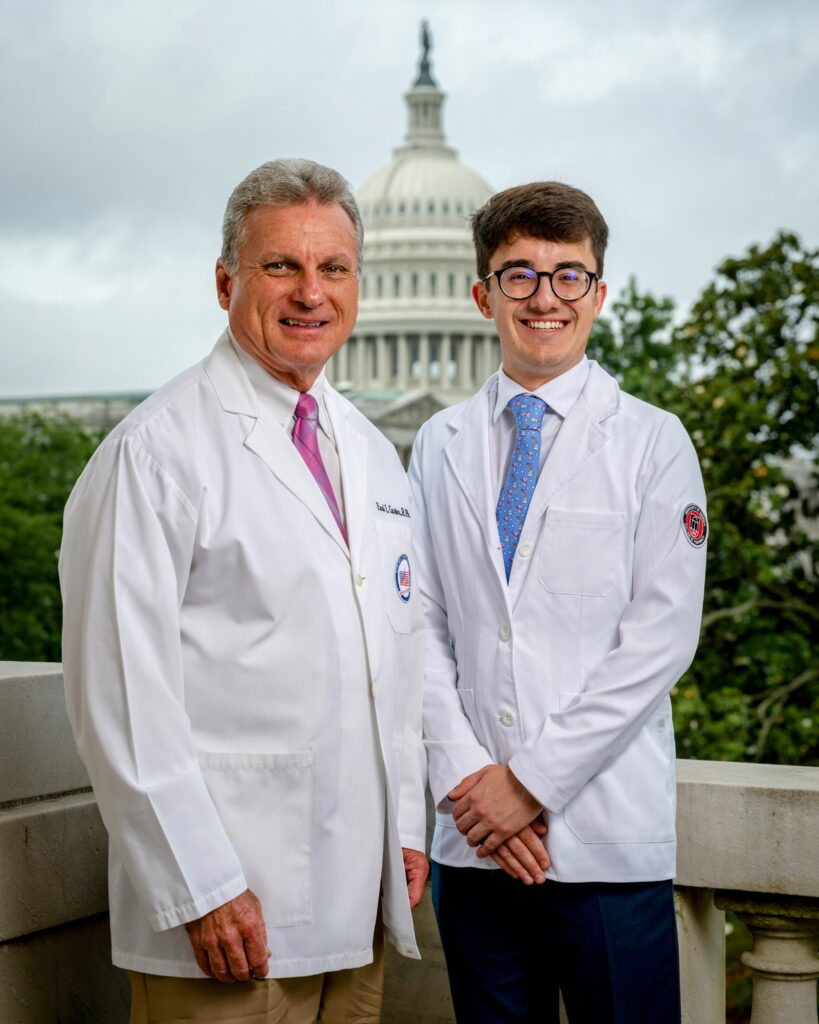 “I couldn’t agree more—my pharmacy knowledge was foundational this summer and highlights the value pharmacists can bring to any environment,” concurred Gomez, who followed in Cole’s footsteps by working as Representative Buddy Carter’s (R-GA) Pharmacy Fellow this summer, an opportunity afforded to one rising P2 every year through a unique partnership between the UGA College of Pharmacy and Carter’s office. “I got to work on everything from drafting legislation for improvements to naloxone accessibility in public settings to writing comments to FDA on their recently proposed rule to standardize patient medication information,” explained Gomez.
“I couldn’t agree more—my pharmacy knowledge was foundational this summer and highlights the value pharmacists can bring to any environment,” concurred Gomez, who followed in Cole’s footsteps by working as Representative Buddy Carter’s (R-GA) Pharmacy Fellow this summer, an opportunity afforded to one rising P2 every year through a unique partnership between the UGA College of Pharmacy and Carter’s office. “I got to work on everything from drafting legislation for improvements to naloxone accessibility in public settings to writing comments to FDA on their recently proposed rule to standardize patient medication information,” explained Gomez.
For him, the fellowship was an opportunity to have a real impact on the profession while doing good by his RxDAWGS commitment and pledge to “…being an agent of change.” “We talk about issues such as PBM regulation and provider status all the time in classes and org meetings, but I never thought I’d get the chance to work directly with an office advocating so strongly for pharmacists and patients on those issues. There’s a real sense that we’re going to make significant progress on PBM accountability and affordable drug pricing this session, and I’m glad that I was able to play a role in that, no matter how small.”
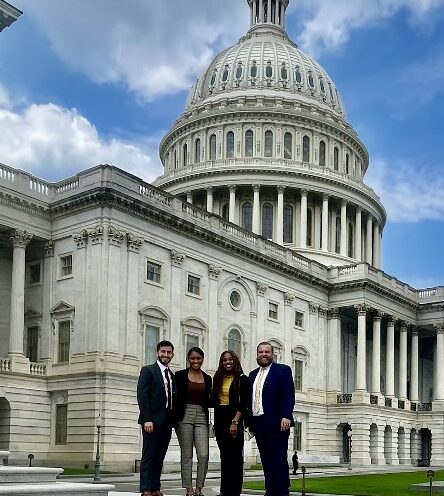 Gomez and Cole weren’t alone on the Hill this summer, though. “I have to say, it was surprising to run into PharmDawgs everywhere up here,” says Tonisha Gaitor, P3 and MBA degree candidate, who bumped into Gomez and Dr. Parth Patel, ‘23, during a congressional briefing on the Equitable Community Access to Pharmacist Services Act. Gaitor recently concluded an internship with the Pharmacy Quality Alliance (PQA), which unites more than 250 member organizations in their mission to improve medication safety, adherence, and appropriate use.
Gomez and Cole weren’t alone on the Hill this summer, though. “I have to say, it was surprising to run into PharmDawgs everywhere up here,” says Tonisha Gaitor, P3 and MBA degree candidate, who bumped into Gomez and Dr. Parth Patel, ‘23, during a congressional briefing on the Equitable Community Access to Pharmacist Services Act. Gaitor recently concluded an internship with the Pharmacy Quality Alliance (PQA), which unites more than 250 member organizations in their mission to improve medication safety, adherence, and appropriate use.
Passionate about the unique role pharmacists have in leading quality-related initiatives at a systems level, Gaitor was particularly excited to contribute to the PQA’s upcoming third edition of their public-access Social Determinants of Health (SDOH) Resource Guide, which provides organizations concrete and actionable intervention, screening, and referral tools to help address SDOH barriers that limit patient access to healthcare. “I personally focused on food and nutrition insecurity and engaged in outreach with member organizations to research new pharmacy-driven solutions to the issue,” she explained, adding, “I also got to propose new benefits for members, write blog posts for the non-profit, and expand member engagement efforts. The internship has definitely reinforced my interest in non-traditional pharmacy careers.”
Gaitor’s transformative experience with the alliance almost perfectly mirrors that of Dr. Kyra Leonard, ‘23, who rotated with PQA in her final year of pharmacy school during a virtual APPE experience. Now, she works as the organization’s Executive Fellow and similarly contributes to their SDOH guide, among many other responsibilities. “I’m most excited to start precepting pharmacy students this September and share with them the importance of quality stewards like PQA and why addressing SDOHs is so vitally important to elevating healthcare quality,” said Leonard. “This is the sort of experience that changes your perspective as a healthcare provider, and I can’t wait to help precept and transform the next generation of pharmacists, opening their eyes to the possibilities that exist in non-traditional career pathways.”
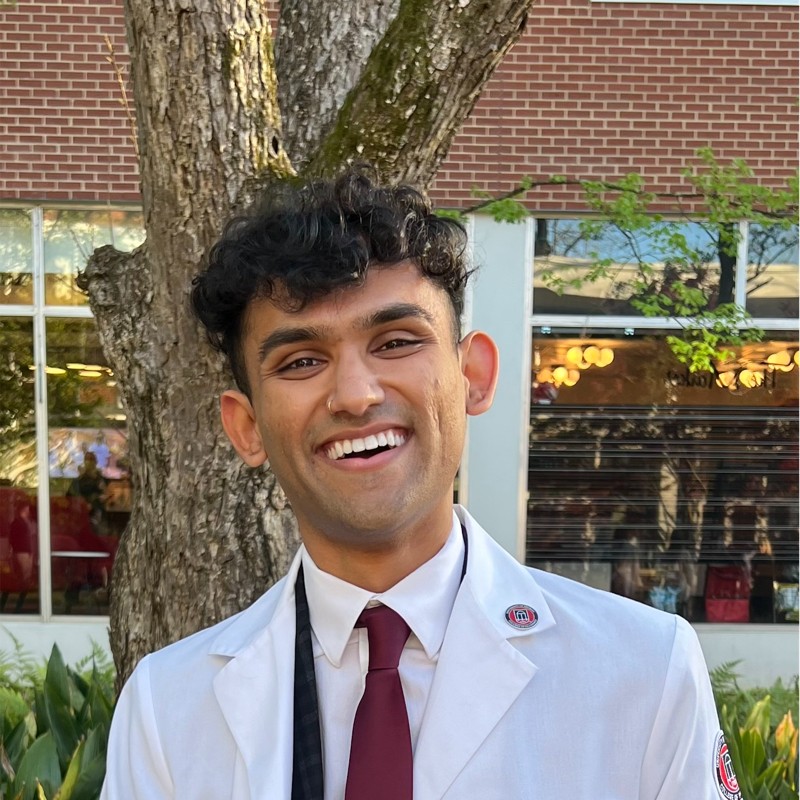
Across the city, Dr. Patel—who spends his Tuesdays and Thursdays at the headquarters of the American Pharmacists Association (APhA), just steps away from the Lincoln Memorial—shared that “…non-traditional pharmacy careers are something I’m starting to learn a lot about.” A current Executive Resident with APhA, Dr. Patel is continuing to explore association management after being heavily involved in regional leadership with the Student National Pharmaceutical Association (SNPhA) throughout pharmacy school. In his new role, he works with the Board of Pharmacy Specialties, learning about project management, continuing education for pharmacists, and the logistics and operations behind making a certification agency run.
“I’m still figuring out what career I might want in the long-term, but I couldn’t be happier to be in D.C. for the next year. Opportunities are everywhere; the networking culture is strong; I’m learning about new pharmacy organizations and pressing policy topics every day; and I’m also constantly meeting new faces. It’s the perfect place for me right now,” Patel said with a satisfied grin. “Oh! And my community is never far,” he added with a wink.
And he’s right. When PharmDawgs can—and do—work all around the country, it’s intriguing how serendipity seems to keep the college connected and close. “When I was in school, I was friends and a fellow class officer with Sarah,” Patel added. “It’s funny how, despite moving nearly 600 miles from Athens after graduation, we’ve both ended up in the same city, just three miles away from each other. I guess that’s just what happens when a city needs pills and policy,” Parth joked. “You get highly skilled, versatile, UGA-trained pharmacists—who are making a difference—everywhere.”
Pictured from top:
Sarah Adam Bignault ’23 outside Grubb’s Pharmacy
Roswell Cole, P3, alongside Sen. Blackburn
Rep. Buddy Carter and Bryan Gomez, P2
Oliver Valdez, Dr. Kyra Leonard ‘23, Tonisha Gaitor, P3, and Micah Cost
Dr. Parth Patel ’23


